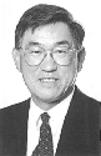William C. W. Mow
For his outstanding achievements as an entrepreneur in the electronics and clothing industries, the Schools of Engineering are proud to present the Distinguished Engineering Alumnus Award to William C. W. Mow.
Chairman and CEO,
Bugle Boy Industries
PhD 1967

On his boyhood
I was born in Hangchow, China. My father was chief of the military committee for Chiang Kai-shek's nationalistic government at the United Nations when Mao Tse-tung took over China. With the Communists in power, my father remained in the United States, and the rest of my family emigrated to this country when I was 13. I credit much of my success to the emphasis my family placed on education when I was a child.
On his experience at Purdue
At Purdue I was totally single-minded: I wanted to get my doctoral degree. Nineteen sixty-seven was the year when Bob Griese was playing football at Purdue, but when we had games in the stadium, I was studying. That was how single-minded I was, which is incredible when I think of it! The most important thing was to pass my qualifying exam and to publish in recognizable journals.
My major professor, K. S. Fu, was somebody I really looked up to. The amount of papers he had published-it's incredible! It's so overwhelming, you're in total awe. Because of that, I think I worked harder and was even more dedicated; he made my studies that much more challenging. As a result, from my dissertation I published four papers in a prime technical journal on computing. That happened because of the drive and concentration and dedication you have when you set out to do something.
On his beginnings as an entrepreneur
The year I got my PhD-1967-was one of the best years ever for PhD's. I went on eight interviews and got eight offers. Each offer was higher than the last. I accepted a position with Litton Industries and worked there two years designing computers for guidance and control systems. In those days Litton was having a hard time on Wall Street. I saw an opportunity to seek seed money to start a company to create instrumentations required to develop large-scale integration technology and metal oxide semiconductor circuits. So in 1969 I founded Macrodata, which developed techniques for testing large-scale integrated chips. As an entrepreneur, I discovered, you have to deliver; you have to find an investor to put the money in; you're the person who carries the ball. Everything is you. I'm used to it by now. It's that kind of challenge that's exciting.
On entering the clothing industry
Since 1977 I've headed Bugle Boy Industries, which started out as a manufacturer of young men's clothing and now sells clothing for the whole family. Going from the electronics industry to the clothing industry wasn't just difficult; it was more like a nightmare! I thought that anybody who could invent equipment with millions of wires and hundreds of thousands of components measuring accuracies to a billionth of a second should be able to make a pair of pants. How wrong I was! I got myself a school-of-hard-knocks PhD in understanding every step in composing a garment.
Eventually, I asked myself, "What will separate us from businesses that do the same thing?" The conclusion I came to was that I must stabilize Bugle Boy's costs so that I can sell the same thing at similar prices year-in, year-out. We revamped the company's management information system, and now our designs are prepared on computers in California and sent electronically to production facilities around the world. Stock is closely monitored, and laptop computers update our sales staff on stock and delivery schedules. With this technological advantage, Bugle Boy has become the number-one opening price brand in department stores. But not even today do I feel comfortable in this business!
On Bugle Boy's 'greatest hits' and coming challenges
The parachute pants we introduced 10 years ago took us from a $10 million company to a $80 million company. From there we went to $510 million by 1990, largely as a result of our "cargo" clothing, which had a Top Gun look. And then who can forget that line from our ads: "Excuse me, are those Bugle Boy jeans you're wearing?" We've been successful in positioning ourselves as a "family brand" for the 1990s-the value decade-and we're very proud of that.
Our job is not yet done on the department-store level, however. We aim to more than double our business and still provide stability and offer value to consumers. Beyond that, global business is in the cards. We have already made substantial contacts in China. Because we are smaller and more nimble than some of our competitors, we think we can succeed in that vast market.
- 1994:
- Trans-Pacific Golden Image Award.
- 1994:
- World Trade Hall of Fame Award.
- 1991:
- Juvenile Diabetes Foundation's Father of the Year Award.
- 1989:
- Southern California Entrepreneur of the Year.
- 1977-present:
- Chairman and CEO, Bugle Boy Industries. Oversees operation of $500 million manufacturer of casual clothing.
- 1969-1976:
- President, Macrodata. Corporation supplied test equipment to semiconductor giants including Intel, Motorola Semiconductor Int'l, and Siemens.
- 1967-1969:
- Program Manager, Litton Industries.
- 1963-1965:
- Logic Design Engineer, Honeywell. Designed H-1800 memory barricade and H-300 memory bus controller.
BSEE 1959, Rensselaer Polytechnic; MSEE 1961, Polytechnic Institute of Brooklyn; PhD 1967, Purdue.
